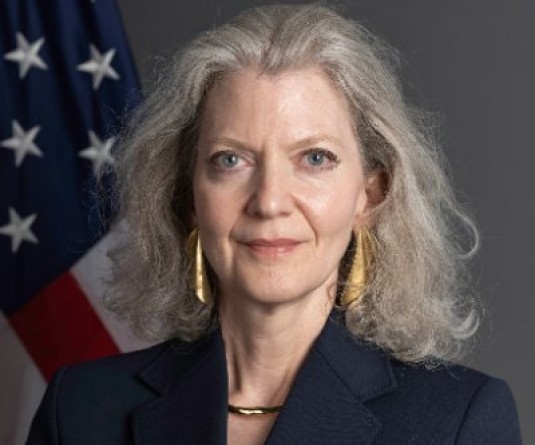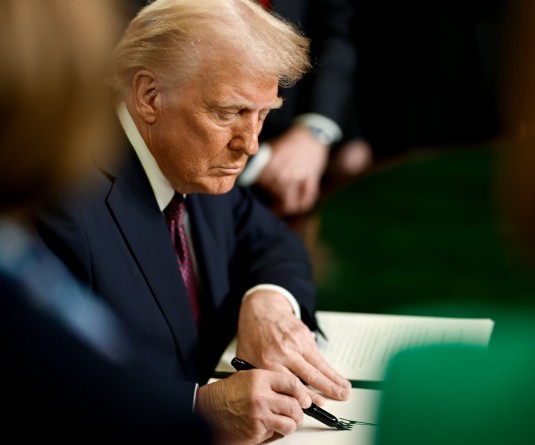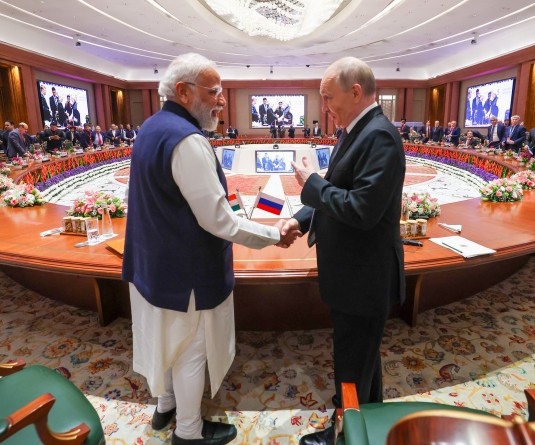
A Libyan rebel prays on a checkpoint on the frontline near Zwitina, the outskirts of the city of Ajdabiya, south of Benghazi, eastern Libya on Thursday, March 24. (AP Photo)
TRIPOLI, March 24 (Reuters): Western warplanes hit Libya for a fifth night on Thursday, but so far have failed to stop Muammar Gaddafi's tanks shelling rebel-held towns or dislodge his armor from a strategic junction in the east. Gaddafi's tanks rolled back into Misrata under the cover of darkness and began shelling the area near the main hospital, residents and rebels said, resuming their attack after their guns were silenced in daylight hours by Western airstrikes.
Government snipers in the city, Libya's third largest, were undeterred by the bombing raids though and had carried on firing indiscriminately throughout, residents said. A rebel spokesman said the snipers had killed 16 people.
"Government tanks are closing in on Misrata hospital and shelling the area," said a doctor in Misrata who was briefly reached by phone before the line was cut off. It was impossible to independently verify the reports. A loud explosion was heard in the Libyan capital Tripoli early on Thursday and smoke could be seen rising from an area where a military base is situated.
Libyan officials took journalists to a Tripoli hospital early on Thursday to see what they said were the charred bodies of 18 military personnel and civilians killed by Western warplanes or missiles overnight. The U.S. military said it had successfully established a no-fly zone over Libya's coastal areas and had moved on to attack Gaddafi's tanks. The allies flew 175 sorties in 24 hours, with the U.S. flying 113 of those, a U.S. commander said.
Britain said on Thursday it had launched guided Tomahawk missiles from a Trafalgar class submarine at air defense targets as part of the coalition plan to enforce the resolution. French Defense Minister Gerard Longuet said France had destroyed some 10 Libyan armored vehicles over three days. The U.N. Security Council resolution he said, "stipulates that the coalition has all means available to protect the civilians. What's threatening the population today is the tanks and artillery," he said in an interview with Le Figaro.
The Libyan government denies its army is conducting any offensive operations and says troops are only defending themselves when they come under attack. But a resident in Zintan, southwest of Tripoli said Gaddafi forces were bringing up more troops and tanks to bombard the rebel-held town. Rebels forces in the east meanwhile were still pinned down outside the strategic junction at Ajdabiyah after more than three days of trying to recapture it.
Libyan state television said Western planes had struck in Tripoli and in Jafar, southwest of the capital. "Military and civilian targets were attacked by colonialist crusaders," the television said. Libyan government officials have accused Western powers of killing dozens of civilians, but have not shown reporters in the capital any evidence of such deaths. U.S. military officials deny any civilians have been killed in airstrikes.
Government snipers in the city, Libya's third largest, were undeterred by the bombing raids though and had carried on firing indiscriminately throughout, residents said. A rebel spokesman said the snipers had killed 16 people.
"Government tanks are closing in on Misrata hospital and shelling the area," said a doctor in Misrata who was briefly reached by phone before the line was cut off. It was impossible to independently verify the reports. A loud explosion was heard in the Libyan capital Tripoli early on Thursday and smoke could be seen rising from an area where a military base is situated.
Libyan officials took journalists to a Tripoli hospital early on Thursday to see what they said were the charred bodies of 18 military personnel and civilians killed by Western warplanes or missiles overnight. The U.S. military said it had successfully established a no-fly zone over Libya's coastal areas and had moved on to attack Gaddafi's tanks. The allies flew 175 sorties in 24 hours, with the U.S. flying 113 of those, a U.S. commander said.
Britain said on Thursday it had launched guided Tomahawk missiles from a Trafalgar class submarine at air defense targets as part of the coalition plan to enforce the resolution. French Defense Minister Gerard Longuet said France had destroyed some 10 Libyan armored vehicles over three days. The U.N. Security Council resolution he said, "stipulates that the coalition has all means available to protect the civilians. What's threatening the population today is the tanks and artillery," he said in an interview with Le Figaro.
The Libyan government denies its army is conducting any offensive operations and says troops are only defending themselves when they come under attack. But a resident in Zintan, southwest of Tripoli said Gaddafi forces were bringing up more troops and tanks to bombard the rebel-held town. Rebels forces in the east meanwhile were still pinned down outside the strategic junction at Ajdabiyah after more than three days of trying to recapture it.
Libyan state television said Western planes had struck in Tripoli and in Jafar, southwest of the capital. "Military and civilian targets were attacked by colonialist crusaders," the television said. Libyan government officials have accused Western powers of killing dozens of civilians, but have not shown reporters in the capital any evidence of such deaths. U.S. military officials deny any civilians have been killed in airstrikes.
Libyans will determine fate, not West: Gates
CAIRO, March 24 (Reuters): Defense Secretary Robert Gates said on Wednesday it would be up to Libyans to determine their future, stressing the limits of U.S. involvement in what threatens to become a protracted civil war. Gates arrived in Libya's neighbor Egypt as Western warplanes pounded Muammar Gaddafi's forces for the fifth night in a row.
Gates, who had been a voice of caution in Washington in the run-up to military action in Libya, was in Cairo after a two-day trip to Russia that threw a spotlight on anxiety over coalition strikes on Gaddafi's air defenses and artillery. Russia, China, India, Brazil and other developing countries have condemned air strikes as risky and unwarranted.
In Cairo, one Egyptian reporter drew comparisons to the 2003 Iraq invasion, which Gates swiftly rejected. Another journalist asked whether he would consider outside mediation to end the conflict, a possibility he dismissed. "It seems to me that if there is a mediation to be done ... it is among the Libyans themselves. This matter at the end of the day is going to have to be settled by Libyans," Gates said. "It's their country."
The U.S. military, already stretched by years of fighting in Afghanistan and Iraq, says it will hand over command of the operation to coalition allies in the coming days. Gates suggested that could happen as soon as Saturday, but refused to be pinned down to a date. "The president has made clear that the United States is not going to have the lead on this operation for the longer term, and in fact for more than a week or so -- from the beginning of the operation," he said.
The air strikes began on Saturday, March 19, after the United Nations authorized the use of military force to prevent Gaddafi from killing civilians. Libyan Foreign Minister Moussa Koussa telephoned U.S. Assistant Secretary of State Jeff Feltman on Sunday after the barrage started, a senior administration official said, but added this was not seen as part of any effort by Gaddafi to craft an exit strategy. The attacks in Libya overshadowed Gates' first visit to Egypt since its uprising led to the ouster of Egyptian President Hosni Mubarak last month, a revolution that helped inspire Libyan rebels.
Gates brushed off suggestions the United States was overtly siding with the rebels in the internal Libyan conflict, saying the U.N.-backed coalition action was limited to preventing Gaddafi from "slaughtering his own people."
"But in terms of much beyond that, I don't think that much has happened. I think these folks are still mainly fighting on their own," Gates said.
Gates, who had been a voice of caution in Washington in the run-up to military action in Libya, was in Cairo after a two-day trip to Russia that threw a spotlight on anxiety over coalition strikes on Gaddafi's air defenses and artillery. Russia, China, India, Brazil and other developing countries have condemned air strikes as risky and unwarranted.
In Cairo, one Egyptian reporter drew comparisons to the 2003 Iraq invasion, which Gates swiftly rejected. Another journalist asked whether he would consider outside mediation to end the conflict, a possibility he dismissed. "It seems to me that if there is a mediation to be done ... it is among the Libyans themselves. This matter at the end of the day is going to have to be settled by Libyans," Gates said. "It's their country."
The U.S. military, already stretched by years of fighting in Afghanistan and Iraq, says it will hand over command of the operation to coalition allies in the coming days. Gates suggested that could happen as soon as Saturday, but refused to be pinned down to a date. "The president has made clear that the United States is not going to have the lead on this operation for the longer term, and in fact for more than a week or so -- from the beginning of the operation," he said.
The air strikes began on Saturday, March 19, after the United Nations authorized the use of military force to prevent Gaddafi from killing civilians. Libyan Foreign Minister Moussa Koussa telephoned U.S. Assistant Secretary of State Jeff Feltman on Sunday after the barrage started, a senior administration official said, but added this was not seen as part of any effort by Gaddafi to craft an exit strategy. The attacks in Libya overshadowed Gates' first visit to Egypt since its uprising led to the ouster of Egyptian President Hosni Mubarak last month, a revolution that helped inspire Libyan rebels.
Gates brushed off suggestions the United States was overtly siding with the rebels in the internal Libyan conflict, saying the U.N.-backed coalition action was limited to preventing Gaddafi from "slaughtering his own people."
"But in terms of much beyond that, I don't think that much has happened. I think these folks are still mainly fighting on their own," Gates said.
At least 15 killed in Syrian city of Daraa: Activists
DARAA, March 24 (AFP): Human rights activists said at least 15 people were killed on Wednesday in the volatile Syrian city of Daraa, the focal point of a week of anti-regime protests. Activists and residents said security forces opened fire on protesters outside the Omari mosque early Wednesday, after hundreds of people had gathered overnight to prevent police from storming it, and that shooting had continued sporadically over the course of the day.
One activist said "at least nine people were killed in the attack on the mosque, including a child, a woman and two members of the security forces," and that six more were killed in attacks on a funeral procession later in the day. "At least thirteen were killed in the overnight attack on the mosque, and we estimate five or six were shot dead during the funeral procession," said another activist. Earlier, an AFP reporter saw two bodies being brought into the city hospital shortly after gunfire broke out in the afternoon around the mosque, where activists have been holed up for a week.
An 11-year-old girl was also killed by a stray bullet when security forces allegedly opened fire on a funeral procession Wednesday for two of those killed overnight, the activist said. The government of President Bashar al-Assad has promised to probe the Daraa killings, but analysts warn that the situation is turning increasingly volatile. But state-run television reported that Assad had fired Daraa Governor Faysal Ahmad Khaltoum, days after young protesters burned down the local courthouse.
Daraa, a tribal city near the Jordanian border, has witnessed daily protests for the past week against the regime of Assad, whose Baath party has ruled Syria uncontested for 40 years. Syria, a country infamous for its iron grip on secur ity that is still under a 1963 emergency law banning demonstrations, is the latest state in the Middle East to witness an uprising against a long-running autocratic regime. The official SANA news agency gave a different version of the overnight attack, saying it was carried out by an "armed gang" and left four people dead including a security force member.
"An armed gang after midnight attacked a medical team in an ambulance at the Omari mosque, killing a doctor, a paramedic and the driver," before police intervened and made some arrests, said the report. There was no way to verify the reports, but an AFP correspondent saw a damaged ambulance on a main street of Daraa amid massive security Wednesday.
DARAA, March 24 (AFP): Human rights activists said at least 15 people were killed on Wednesday in the volatile Syrian city of Daraa, the focal point of a week of anti-regime protests. Activists and residents said security forces opened fire on protesters outside the Omari mosque early Wednesday, after hundreds of people had gathered overnight to prevent police from storming it, and that shooting had continued sporadically over the course of the day.
One activist said "at least nine people were killed in the attack on the mosque, including a child, a woman and two members of the security forces," and that six more were killed in attacks on a funeral procession later in the day. "At least thirteen were killed in the overnight attack on the mosque, and we estimate five or six were shot dead during the funeral procession," said another activist. Earlier, an AFP reporter saw two bodies being brought into the city hospital shortly after gunfire broke out in the afternoon around the mosque, where activists have been holed up for a week.
An 11-year-old girl was also killed by a stray bullet when security forces allegedly opened fire on a funeral procession Wednesday for two of those killed overnight, the activist said. The government of President Bashar al-Assad has promised to probe the Daraa killings, but analysts warn that the situation is turning increasingly volatile. But state-run television reported that Assad had fired Daraa Governor Faysal Ahmad Khaltoum, days after young protesters burned down the local courthouse.
Daraa, a tribal city near the Jordanian border, has witnessed daily protests for the past week against the regime of Assad, whose Baath party has ruled Syria uncontested for 40 years. Syria, a country infamous for its iron grip on secur ity that is still under a 1963 emergency law banning demonstrations, is the latest state in the Middle East to witness an uprising against a long-running autocratic regime. The official SANA news agency gave a different version of the overnight attack, saying it was carried out by an "armed gang" and left four people dead including a security force member.
"An armed gang after midnight attacked a medical team in an ambulance at the Omari mosque, killing a doctor, a paramedic and the driver," before police intervened and made some arrests, said the report. There was no way to verify the reports, but an AFP correspondent saw a damaged ambulance on a main street of Daraa amid massive security Wednesday.






